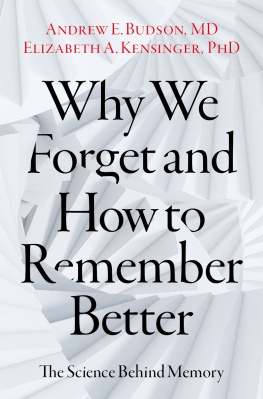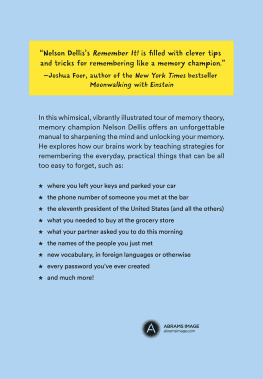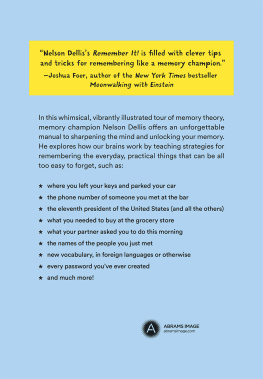Improving Your Memory
Improving Your Memory
How to Remember What Youre Starting to Forget
4TH EDITION
Janet Fogler and Lynn Stern

Copyright 1988 Janet Fogler and Lynn Stern
1994, 2005, 2014 Johns Hopkins University Press
All rights reserved. Published 2014
Printed in the United States of America on acid-free paper
9 8 7 6 5 4 3 2 1
Johns Hopkins University Press
2715 North Charles Street
Baltimore, Maryland 21218-4363
www.press.jhu.edu
Library of Congress Cataloging-in-Publication Data
Fogler, Janet.
Improving your memory : how to remember what youre starting to forget / Janet Fogler and Lynn Stern. Fourth edition.
pages cm
ISBN 978-1-4214-1570-3 (pbk. : alk. paper) ISBN 1-4214-1570-4 (pbk. : alk. paper) ISBN 978-1-4214-1571-0 (electronic) ISBN 1-4214-1571-2 (electronic) 1. MemoryAge factors. 2. Memory in old age. 3. Mnemonics. I. Stern, Lynn, 1949 II. Title.
BF724.85.M45F64 2014
153.122dc23 2014008681
A catalog record for this book is available from the British Library.
Special discounts are available for bulk purchases of this book. For more information, please contact Special Sales at 410-516-6936 or .
Johns Hopkins University Press uses environmentally friendly book materials, including recycled text paper that is composed of at least 30 percent post-consumer waste, whenever possible.
Contents
Acknowledgments
We would like to express our appreciation and gratitude to all of our colleagues at the University of Michigan Medical Centers Turner Geriatric Clinic. We especially thank Ruth Campbell for her early recognition of the importance of addressing age-related memory concerns and for her encouragement and support through the years. Mary Rumman has worked with us to offer memory improvement classes in the community. Tami Remington provided us with the latest information on medications that may have an impact on memory. Jennifer Howard, Barbara Betts Swartz, and Maire Ready updated the appendix on Alzheimers disease. We appreciate all of them for their contributions.
The W. K. Kellogg Foundation sponsored our first research in this area as well as the memory improvement programs we offered throughout the country.
Our editor, Jackie Wehmueller, and copy editor, Michele Callaghan, have given us generously of their time and talents. Their thoughtful comments have helped make this edition even better.
Scott and Neal have brainstormed memory solutions, eaten postponed meals, and as always, given us their support.
Last, we owe a tremendous debt of gratitude to the hundreds of people who have been members of our memory improvement classes. You have provided us with questions, solutions, and humorous examples. Thanks for the inspiration and fun!
Part I How Memory Works
1
You Can Improve Your Memory
Our heads may be small, but they are as full of memories as the sky may sometimes be full of swarming bees, thousands and thousands of memories, of smells, of places, of little things that happened to us and which came back, unexpectedly, to remind us who we are.
Alexander McCall Smith
Since 2005, when we wrote the previous edition of this book, technology has exploded with fixes for common memory lapses. There is a reason for this. People of all ages want to avoid the consequences of forgetting. Car lights, space heaters, and coffee pots can turn themselves off. Thermostats can be programmed to adjust the heat and air conditioning automatically. Smartphones and devices help us keep track of appointments, phone numbers, and e-mail addresses and alert us with alarms when its time to do something.
But, we are still anxious when words and names stay stuck on the tips of our tongues; we still misplace items and forget to do things; memory is still affected by illness, overwork, or mood. We are more than ever challenged by a bombardment of information and overextended schedules. More than ever we talk with each other and in the media about failing memories, and we wonder what to do about them.
The information about memory and the memory improvement techniques in Improving Your Memory will help you understand how memory works, why you forget, and how memory changes with age. By combining this understanding with the basic tips and techniques described in this book, you can improve your memory.
The basics still apply:
No one can remember everything. We have to make choices about where to put our effort.
The first step is to pay attention to the things we want to remember.
There are techniques for remembering the things that are most important to each of us.
We need to keep up with mental, physical, and social activities without overwhelming ourselves. If we establish good habitssuch as keeping lists, returning items to their proper place, and reducing clutter in our homeswe can relieve the clutter in our minds.
EXAMPLES
Barbara works part-time in a toy store, is on the board of the library, and never misses her nephews soccer games. Recently, she was embarrassed when she ran into an acquaintance and could not call her by name. A week later Barbara walked out of the shopping mall and couldnt remember where she had parked her car. The following month, she realized she was losing track of the cast of characters in a novel she was reading. Then she completely forgot a lunch date with a good friend. Barbara was extremely worried, especially when she thought of her uncle, who had been diagnosed with Alzheimers disease.
Carl is an engineer at a water treatment plant. Last month he couldnt remember if he had changed the oil in his car or just thought about doing it. He missed the turn to the recreation center and didnt realize it until several streets passed by. He couldnt remember where in the garage he had hidden a house key. Carl wondered whether the problem was his memory or the stress he was under at work.
You and your friends may have had experiences similar to Carls and Barbaras, and you, too, may have concerns about your memory. People of all ages complain about forgetting, but, as people grow older, they often worry when they cannot remember a familiar name or where they parked the car. Memory does change as people age, but almost everyone can improve memory with training and practice.
Here are some common complaints shared by friends and clients. (And we confess that we have made these statements, too!)
I went into a room and couldnt remember why.
I couldnt remember what I wanted to ask the doctor.
I hid a birthday gift for my wife and couldnt remember where.
I had to pay a late fee because I didnt pay the electric bill on time.
I forgot to bring my camera on a trip.
I went to the store for milk and got everything but.
I forgot how to enter a new contact on my smartphone.
I forgot my sisters birthday.
I forgot whether I took my medication.
I heard a great joke, but I cant remember what it was.
If you have had any of these experiences, you can benefit from this book. We will teach you how to recognize and address common memory problems by discussing how memory works; how memory changes with age; factors that affect memory; and concrete strategies for improving memory.
To make this book as useful as possible, we include many suggestions about what you can do in everyday life. Examples and pen-and-paper exercises demonstrate memory concepts and techniques.
Next page







